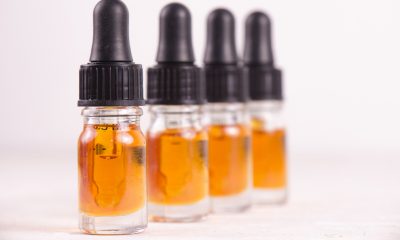With novel food regulations coming into force this week there is much discussion in the industry about the various forms of CBD.
Most of us know about the potential benefits of cannabidiol (CBD), including alleviating pain, easing symptoms of anxiety and improving sleep. But as a consumer, do you know your whole-plant products from your isolate?
Here, Cannabis Health explains what each of the three main forms – full spectrum, broad spectrum and isolate – bring to the table.
Isolate
A popular choice for many, CBD isolate is the purest form of CBD where all of the other compounds have been removed leaving the ‘isolated’ CBD. It is refined, meaning it has no distinct taste or odour.
The slight downside of this form, however, is that the effects may be less notable than when using other products. A 2015 animal study indicated that CBD isolate’s effects against pain and inflammation may only occur at a specific dose, rather than the benefits increasing alongside the dosage as in other types.
While this may be a deal-breaker for some, those who wish to take high does of CBD may prefer isolate.
Full-spectrum
Full-spectrum CBD, on the other hand, contains all cannabis plant compounds, as well as up to 0.3 per cent THC, and therefore may have a more potent effect than isolate. It is often used for a range of health issues including pain relief and treatment for mental disorders.
Supporting this, a 2018 study suggested that full-spectrum CBD is more effective for pain than CBD isolate because of the combined effects of CBD and THC. However, users should be careful and do their own research to ensure the quantity of THC in their chosen product is suitable for their needs.
According to several outlets, full-spectrum CBD is said to offer far more bang for your buck – every drop features an array of these molecules that work together to give a more pronounced effect – however this all depends on how intense an impact you need and want.
In addition, many CBD users opt for the full-spectrum form as it is more natural and less processed than CBD isolate.
Broad-spectrum
Broad-spectrum CBD – the third of the three main forms of the remedy – is very similar to the full-spectrum variety in that it contains additional cannabis plant compounds.
These products, however, contains zero or trace amounts of THC, which should be less than the 0.3 per cent found in full-spectrum.
Many suggest this make-up means broad-spectrum falls somewhere between full-spectrum CBD and CBD isolate.
But unlike CBD isolate, broad-spectrum products may produce heightened effects because they contain additional compounds that work together – known as the ‘entourage effect’.
This collaboration between compounds has been reported to produce additional or improved benefits for conditions including arthritis and fibromyalgia.
Despite potentially containing traces of THC, broad-spectrum CBD does not lead to any unwanted ‘high’ effects.
Whether you’re a first-time CBD user or have been utilising the remedy for some time, it is important to remember that everyone is different, and no particular product or dosage amount will work for everyone.
There is currently no set evidence to prove that one type of CBD will have a greater impact on any particular condition than others, however as usage grows it is hoped that the research carried out will begin to diversify the various forms of CBD.

 News6 months ago
News6 months ago
 Science5 months ago
Science5 months ago
 Industry6 months ago
Industry6 months ago
 News6 months ago
News6 months ago
 News5 months ago
News5 months ago
 Health5 months ago
Health5 months ago
 News5 months ago
News5 months ago
 Health3 months ago
Health3 months ago












